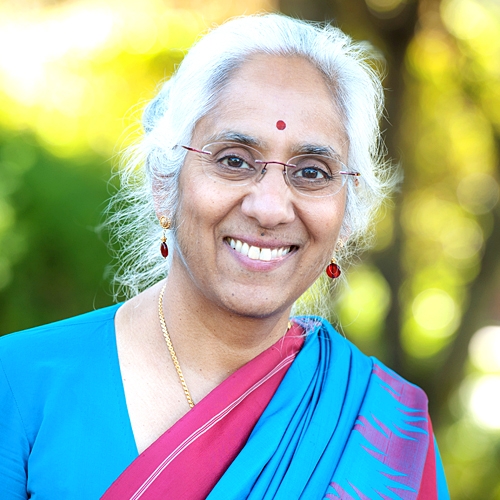
Clients, Colleagues, or Critics? Negotiating Gaps between evidence and community standards
What does emerging science on neurobiology and epigenetics tell us about decision making in pregnancy, labour and birth? Does birth place matter? Should caesarean reduction be the goal? How long is labour? How long is human gestation? How accurate is an ultrasound date? What happens when clients want care that does not align with community standard? How do our messages about evidence and risk affect quality and safety? What do women say? What do providers believe? This session will explore new patient-centered outcomes from research on quality, safety, risk and responsibility. Together we will review and discuss emerging tools and strategies to facilitate conversations about the best available evidence and respectful maternity care.


Saraswathi Vedam is Lead Investigator of the Birth Place Lab at University of British Columbia. Over 35 years, she has been a midwife, educator, and researcher. She led the provincial, community-based participatory studies, Changing Childbirth in BC and the Giving Voice to Mothers Studies, exploring access to respectful maternity care across birth settings in North America. These projects led to two new quality measures: the Mothers’ Autonomy in Decision Making (MADM) scale and the Mothers on Respect (MORi) index, that assess quality and safety as defined by the service user. She is currently PI of a 5-year CIHR funded national study of respectful maternity care across Canada. Professor Vedam has been active in setting international policy on place of birth and interprofessional collaboration. She led a multidisciplinary team to conduct the Access and Integration Maternity care Mapping (AIMM) Study; convened 3 national Home Birth Summits; and chaired the 5th International Normal Labour and Birth Research conference.
Professor Vedam has been active in setting national and international policy on place of birth, and midwifery education and regulation. She has provided expert consultations to policy makers, public health agencies, and legislators in Mexico, Hungary, Chile, China, the Czech Republic, Canada, the US, and India. She was Convener and Chair of 3 national Home Birth Summits. At these historic summits a multi-stakeholder group of leaders (clinicians, consumers, policymakers, legislators, researchers, ethicists, and administrators) crafted a common agenda to address equitable access to high quality care across birth settings in the United States.
Topic: “They Threatened and Bullied Me”: Examining Disparities in Autonomy, Respect, and Mistreatment Across Childbearing Communities - [View Abstract]
Objective 1: List 3 key findings of recent research on women's experiences of and preferences for decision making in maternity care. Objective 2: Discuss the interaction of culture and race with birth decisions and provider-patient conflict. Objective 3: Identify 2 methods to promote respectful maternity care through interprofessional education or communication. Objective 4: Engage in a self-evaluation of their own dialogue style and transparency around provider opinion and bias. Objective 5: Describe 3 specific strategies for effecting change or compromise when there is conflict between the best available evidence and client preferences, consultant recommendations, or community standards
What does emerging science on neurobiology and epigenetics tell us about decision making in pregnancy, labour and birth? Does birth place matter? Should caesarean reduction be the goal? How long is labour? How long is human gestation? How accurate is an ultrasound date? What happens when clients want care that does not align with community standard? How do our messages about evidence and risk affect quality and safety?
What do women say? What do providers believe? This session will explore new patient-centered outcomes from research on quality, safety, risk and responsibility. Together we will review and discuss emerging tools and strategies to facilitate conversations about the best available evidence and respectful maternity care.
Accreditation
CERPs - Continuing Education Recognition Points GOLD Conferences has been designated as a Long Term Provider of CERPs by the IBLCE--Approval #CLT114-07 1 R-CERP
If you have already participated in this program, you are not eligible to receive additional credits for viewing it again. Please send us an email to [email protected] if you have any questions.Tags / Categories
(IBCLC) Education and Communication, (IBCLC) Psychology, Sociology, and Anthropology, (IBCLC) Public Health and Advocacy, (IBCLC) Research, Decision Making & Consent, Evidence-Based Care
How much time do I have to view the presentations?
- The viewing time will be specified for each product. When you purchase multiple items in your cart, the viewing time becomes CUMULATIVE. Ex. Lecture 1= 2 weeks and Lecture Pack 2 = 4 Weeks, you will have a total of 6 weeks viewing time for ALL the presentations made in that purchase.
- Time for viewing the talks begins once you purchase the product. For Live Webinars & Symposiums, the viewing period begins from when the live event takes place. Presentations can be accessed 24/7 and can be viewed as many times as you like during the viewing period.
What are bundled lectures?
- Presentations may be available individually or via a bundled package. Bundled lectures are a set of lectures that have been put together based on a specific category or topic. Some lectures will be available in both individual and lecture form, whereas others will be available only via a bundled lecture pack.
Will there be Handouts?
- YES! Each lecture comes with a PDF handout provided by the Speaker.
Some lectures include a Q&A, what does that mean?
- During our online conferences, presentations that occur live are also followed by a short 15 minute Question & Answer Session. The Speaker addresses questions that were posted by Delegates during the presentation. We include the recording of these Q&A Sessions as a bonus for you.
How can I receive a Certificate?
- If this presentation offers a certificate, once you are done viewing the lecture or the lectures within a bundle, submit your attendance record in order to be able to download your certificate. You'll be able to see which credits are offered for the lecture by hovering over the "Credits Available" link within the "Speakers & Topics" tab.
Professionals that selected this package also viewed

|
|

|







